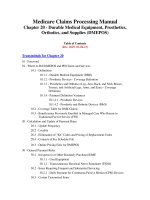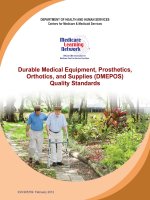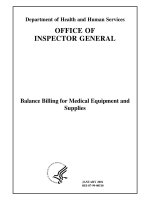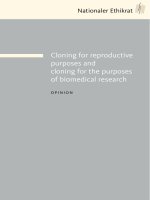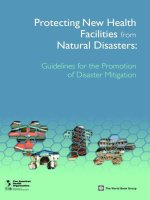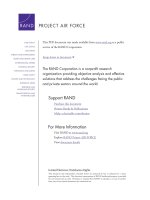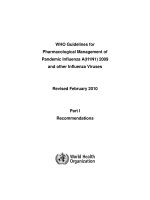Guidelines for Medicines and Medical Equipment Donations and Guidelines for Safe Disposal of Unwanted Pharmaceuticals potx
Bạn đang xem bản rút gọn của tài liệu. Xem và tải ngay bản đầy đủ của tài liệu tại đây (344.8 KB, 52 trang )
REVOLUTIONARY GOVERNMENT OF ZANZIBAR
≥≥≥≥≥≥≥≥≥≥
Guidelines for Medicines and Medical
Equipment Donations
and
Guidelines for Safe Disposal of
Unwanted Pharmaceuticals.
Guidelines for Medicines and Medical
Equipment Donations
and
Guidelines for Safe Disposal of
Unwanted Pharmaceuticals.
Ministry of Health and Social Welfare
In collaboration with:Guidelines for Medicines and Medical
Equipment Donations
and
Guidelines for Safe Disposal of
Unwanted Pharmaceuticals.
Ministry of Health and Social Welfare
In collaboration with:
REVOLUTIONARY GOVERNMENT OF ZANZIBARi
Foreword
The goal of the National Drug Policy is to provide right drugs to the right patients in the right
quantity at the right time and affordable prices. The Ministry of Health and Social Welfare
(MOH&SW) has been making effort to achieve this goal through various ways including
receiving donations from various donors during emergency situation or as development aid.
Unfortunately, there have been no official guidelines to assist the donors and recipients on
Good Donation Practices. Consequently, there has been accumulation of pharmaceutical waste
which threatens people health and environment of our country.
Therefore, the MOH&SW has decided to lay down this guideline which will be used as a
guiding document for both donors and recipients so that Zanzibaris can benefit as much as
possible from the donation. These guidelines have been prepared for the purpose of optimizing
the benefits of the donations and not to hinder the donations.
The implementation of these guidelines requires mutual cooperation between both parties,
donors in one hand and recipient in another.
I therefore, make sincerely call to all stakeholders to take their respective responsibilities toward
good donation practice laid down in this document for the betterment of the health of our
people and environment.
Thank you,
…………………………
Hon. Sultan M.Mugheiry
Minister for Health and Social Welfare.
ZANZIBAR.
ii
Acknowledgement
The Ministry of Health and Social Welfare (MOH&SW) would like to express its sincere
acknowledgement to the World Health Organization (WHO) for providing financial and
technical assistance in the development of these guidelines for Medicines, Medical Supplies and
Equipment Donations. The Ministry also acknowledges financial support provided by the
European Commission (EC) for printing this document.
The Ministry would like to thank all those who have contributed to the development of this
version. The principal contributors for the edition were;
Mr. Habib Ali Sharif – Chief Pharmacist, MOHSW
Mr. Mberik Rashid said – Registrar, Pharmacy Board
Mr. Burhani Othman Simai – Chief Drug Inspector, Zanzibar Pharmacy Board
Mrs. Salma Mohd Said – Assistant Chief Drug Inspector, Zanzibar Pharmacy Board
Mrs. Lydia John Zungufya – Pharmacist, Central Medical Store
Mrs. Mayassa Ali Salum – Pharmacist, Drug Management Unit
Mr. Mohd Omar Mohd – Pharmacist, ZMPC
Mr. Haji Juma Haji – Pharmacist, MMH
Mr. Shija Joseph Shija – Pharmacist, Pharmacy Board
Mr. Zahran Ali Hamad – Pharmacist In charge Pemba
Dr. Mkasha Hija Mkasha – Coordinator, MOH&SW Pemba
Dr. Hassan Ameir Haji – Member, Pharmacy Board
Mr. Haji Ameir Bonde – Acting Chief Government Chemist
Mr. Talib Mahadhi – Pharmacist, Private
Mr. Hamad O. Juma – Head, Pollution Control Dept of Environment
Mr. Ali Hassan Suleiman – Planning Officer, MOH&SW
Mr. Jaffar Abdullah Mussa – Chief Supplies Officer, MOH&SW
Mr. Abdulrazak Juma Fakih deserves special thanks for typing and editing the contents of this
work.
The Ministry appreciates the invaluable contribution from Ms. Rose Shija (NPO EDM/WHO
Tanzania) for coordinating this activity and for her technical and advisory assistance
throughout the development process of the document.
iii
Glossary of Terms
For the purpose of these guidelines, the following definitions may apply:
1. Active ingredient
Is a substance or compound that is intended to be used in the manufacture of
pharmaceutical product as therapeutically active compound (ingredient).
2. Chemical decomposition
Is the fragmentation of pharmaceutical wastes into elements or smaller compounds using
chemicals in accordance to manufacturer’s recommendations followed by a landfill.
3. Container
Is a box, drum or any receptacle, which is to contain pharmaceutical waste to be
administered for safe disposal.
4. Engineered landfill
A landfill which have some features to protect from loss of chemicals into the aquifer.
5. Highly Engineered landfill
A properly constructed and operated landfill site which offers a relatively safe disposal
route of municipal solid wastes, including pharmaceutical wastes.
6. High temperature incineration
An incinerator which operates at very high temperature, have a long combustion
retention times and disperse exhaust gases via a tall chimney, often to high attitudes.
e.g. – cement kiln, coal fired thermal power stations and foundries.
7. Label
Any tag, brand, mark, pictorial or other descriptive matter, written, stenciled, marked,
embossed or impressed on or attached to a container.
8. Landfill
A place whereby pharmaceutical wastes are directly disposed in a landsite without prior
treatment or preparation.
9. manufacturer
Is a person or firm that is engaged in the manufacture of a product.
iv
10. Medium temperature incineration
A two chamber incinerator designed to handle more than1% halogenated compounds and
meets strict emission control standards.
11. Pharmaceutical wastes
All Pharmaceuticals expired or not expire with damaged seals or otherwise declared
eliminated in the world market which should never be used by human unless otherwise
indicated to be used in other institutions.
12. unwanted pharmaceuticals
Pharmaceutical products, whether expired or unexpired, regarded to be not useful or
unnecessary for the purpose intended.
13. Waste encapsulation
Immobilizing the pharmaceuticals in a solid block within a plastic or steel drum.
14. Waste Inertization
Is a variant of encapsulation whereby, the packing materials (e.g. papers, cardboard and
plastic) are removed from the pharmaceuticals, Pills are removed from their blisters, then the
pharmaceuticals are grounded, mixed with water, cement and lime to form paste which is
then disposed to a landfill.
v
List of Abbreviations
DMU - Drug Management Unit
DRA - Drug Regulatory Authority
INN - International Nonproprietary Name
MMH - Mnazi Mmoja Hospital
MDTC - Ministerial Drug and Therapeutical Committee
NGOs - Non Governmental Organizations
NSEL - National Standard Equipment List
MOH&SW - Ministry of Health and Social Welfare
RGoZ - Revolutionary Government of Zanzibar
STGs - Standard treatment Guidelines
WHO - World Health Organization
ZEML - Zanzibar Essential Medicines List
ZFDB - Zanzibar Food and Drug Board
ZFDCA - Zanzibar Food, Drug and Cosmetics Act
ZMCP - Zanzibar Malaria Control Programme
ZNDP - Zanzibar National Drug Policy
ZMED - Zanzibar Medicines and Equipments Donations
vi
Contents
FOREWORD i
ACKNOWLEDGEMENT ii
GLOSSARY OF TERMS iii
LIST OF ABBREVIATIONS v
CONTENTS vi
1.0 INTRODUCTION 1
1.1 The Need for Guidelines 1
1.2 Aims of the Guidelines 2
1.3 Core Principles 2
2.0 GUIDELINES FOR MEDICINE AND MEDICAL SUPPLIES
DONATIONS 3
2.1 Selection of Medicine and Medical Supplies 3
2.3 Quality Assurance of Medicine And Medical Supplies 4
2.4 Information and Management 5
2.5 Packing And Labelling 6
2.6 Other Ways Of Medicine And Medical Supplies Donations 7
2.7 Implementation and Management of Medicine and Medical Supplies
Donations in Zanzibar 7
3.0 GUIDELINES FOR MEDICAL EQUIPMENT DONATIONS 9
3.1 Rationale 9
3.2 Responsibilities of Recipients in Zanzibar 10
3.3 Donor Responsibilities 12
3.4 Criteria for Accepting Donation of Medical Equipment 14
3.5 Criteria for Rejection of Donation 14
4.0 GUIDELINES FOR SAFE DISPOSAL OF UNWANTED
PHARMACEUTICALS 15
4.1 Purpose of the guidelines 16
4.2 What the guidelines do not cover 17
4.3 Consequences of improper disposal or non-disposal of
pharmaceuticals 19
4.4 Public information 19
vii
5.0 METHODS OF DISPOSING PHARMACEUTICAL WASTES 21
5.1 Medicine, Medical supplies and Medical equipments still
at the port of entry 21
5.2 Medicine, Medical supplies and Medical equipment which have
already entered in Zanzibar 21
6.0 SORTING OF PHARMACEUTICALS WASTES 22
6.1 Points to be considered During Sorting Process 22
6.2 Stage in Process of Sorting 22
6.3 Optimum Conditions for Sorting 23
6.4 Sorting Categories 23
7.0 TYPES OF DISPOSAL METHODS
7.2 Landfill 25
7.3 Waste immobilization: 26
7.4 Sewer 27
7.5 Burning in open containers 27
7.6 Medium temperature incineration 27
7.7 High temperature incineration 27
7.8 Chemical decomposition 28
8.0 RECOMMENDED DISPOSAL METHODS 29
8.1 Solids, semisolids and powders 29
8.2 Other drugs 29
8.3 Liquids 30
8.4 Ampoules 31
8.5 Anti- infective drugs 31
8.6 Controlled substances 31
8.7 Antineoplastics 31
8.8 Special treatment for antineoplastics 32
8.9 Disinfectants 32
8.10 Aerosol canisters 33
Annex 1: Table 2. Summary of pharmaceutical categories and disposal
methods 34
Annex 2: An example of an equipment checklist 36
1
1.0 Introduction
Like many other developing countries, Zanzibar has been receiving many donations of
pharmaceutical products from various donor agencies. In most cases, the donations have
been in the form of medicine, medical supplies and equipments that may be released in acute
emergencies or as part of government aid in non-emergency situations. The recipients of
these donations have been RGoZ, religious organizations, local NGOs and individual health
facilities.
Despite of the donors’ good intentions, Zanzibar has been experiencing several problems
associated with donations. Examples include receiving expired medicines or medicines with
short shelf life, medicines which do not comply with the Zanzibar National Drug Policy
(ZNDP), Zanzibar Essential Medicine List (ZEML) and Standard Treatment Guidelines
(STGs), medicine not relevant for emergence situations, medicine labeled in a language which
is not understandable to Zanzibaris, medicine not appropriate for the level of a prescriber at the
intended health facility and alike.
In order to alleviate problems associated with the donations and achieve good donation
practice, the Ministry of Health and Social Welfare has decided to develop official guidelines
based on the existing Zanzibar National Drug Policy, WHO’s Guidelines for Drug Donations
and Zanzibar Food Drugs and Cosmetics Act (ZFDCA).
1.1 The Need for Guidelines
• Donors intend well, but often do not realize the possible inconveniences and
unwanted consequences at the receiving end.
• Zanzibar may need donor support and therefore it is important to specify on what
kind of assistance is needed.
• Pharmaceutical products and medical equipment needs may vary from time to
time according to existing circumstances. Medicine donation must be based on
sound analysis of the need, and their selection and distribution must fit within the
existing policies and administrative system of the ministry responsible for health.
• The quality of pharmaceutical products and medical equipments must meet the
required standards which need to be certified by the recipient.
• Pharmaceutical products and medical equipments may be harmful if misused;
therefore they need to be easily identified through labels and written information.
Expiry dates, handling and storage conditions must be specified because medicines
may expire and need to be destroyed, an exercise which is costly.
In view of what has been described above, the Ministry of Health and Social Welfare has
therefore decided to develop these guidelines to serve the interests of both donors and
recipients.
1.2 Aims of the Guidelines
• To create awareness to both donors and recipients on the standards which have to be
met on medicine, medical supplies and equipments to be received as donations.
• To promote good pharmaceuticals and medical equipments donation practice.
• To stop importation and minimize the accumulation of unwanted pharmaceutical
products, medical supplies and equipments in Zanzibar.
1.3 Core Principles
• Medicine donation should benefit Zanzibar to the maximum extent possible. This
implies that all donations should be based on expressed need and that unsolicited
medicine donations are to be discouraged.
• A donation should be made with full respect for the wishes and the authority of
Zanzibar government and be supportive of the Zanzibar’s health policies and
administrative arrangements
• There should be no double standards in quality of the donated item; this means if the
quality of an item is unacceptable in the donor country it is also unacceptable as a
donation to Zanzibar.
• There should be effective communication between the donors and the RGoZ; this
means donations should be based on expressed need of the RGoZ and should not be
sent without prior consent of the technical authority of the Ministry responsible for
Health.
2
3
2.0 Guidelines for Medicine and
Medical Supplies Donation
2.1 Selection of Medicine and Medical Supplies
i. The Zanzibar Food and Drug Board (ZFDB) is the only responsible body to allow
importation of donated medicine and medical supplies to both public and private
sectors.
The contact person to be addressed for any information pertaining to
sending donations to Zanzibar is:
The Registrar,
Zanzibar Food and Drug Board
P.O. Box 236, ZANZIBAR
Telephone Number: +255-777-414455
Email Address:
ii. Donated medicine and medical supplies should be only those, which are indicated
in the Zanzibar essential medicine list and relevant to the disease patterns.
iii. Restricted pharmaceutical products such as narcotics must be specifically and
separately declared to Zanzibar Food and Drug Board.
iv. Drug samples are not allowed for donation.
v. Large bulk of liquid containers should not be used, they are not suitable for
dispensing purposes and they increase the risk of further contamination of the
products, because of need for repacking.
vi. The strength and formulation of donated medicine and medical supplies should,
as much as possible be similar to those commonly in Zanzibar.
vii. Obsolete pharmaceutical products will never be allowed into the country.
JUSTIFICATION/EXPLANATION
The Ministerial Drug and Therapeutic Committee (MDTC) is the prime responsible
body for specifying the needs of medicine and medical supplies to be donated. It has the
mandate to prevent unsolicited donations, unannounced donations and unwanted donations.
The provision is intended to ensure medicine and medical supplies donations comply with
the National Drug Policy and Zanzibar essential medicine list. It aims at maximizing the
positive impact of the donation, prevent the donations of medicine and medical supplies
which are unnecessary in Zanzibar.
POSSIBLE EXCEPTIONS
i. In acute emergencies, the need for prior consent by the Revolutionary Government of
Zanzibar may be waived, provided the medicine and medical supplies are amongst
those from the WHO – Model list of essential medicines that are in the United
Nations list of emergency relief.
ii. An exception can be made for medicines and medical supplies needed in sudden
outbreaks of uncommon or newly emerging diseases since such medicine and medical
supplies may not be approved for use in Zanzibar.
2.3 Quality Assurance of Medicine and Medical Supplies
i. Donated medicine and medical supplies should have a shelf life of not less than twelve
months from the date of arrival of the consignment.
ii. Donated medicine and medical supplies must be of good quality and obtained from
reliable sources.
iii. WHO Certification Scheme on Quality of Pharmaceutical Products moving in
International Commerce should be used wherever possible.
iv. No medicine and medical supplies should be donated if were already dispensed to
patients, but were returned to Pharmacies or collected in donor countries for the
purpose of donating them to others.
v. Medicine and medical supplies will be subjected to inspection at the port of entry. If
these guidelines are not met, the donation will be rejected.
vi. Medicine and medical supplies must be registered by ZFDB.
JUSTIFICATION/EXPLANATION
1. In order to prevent double standards, medicine and medical supplies of unacceptable
quality in the donor country should not be donated in Zanzibar. Donated medicine
and medical supplies should be authorized for sale in the country of origin and
manufactured in accordance with International standards of Good Manufacturing
Practice (GMP).
2. Unused medicine and medical supplies which have been returned by patients to the
pharmacy in the donor country should not be donated in Zanzibar. In additional to
quality issues, returned medicine and medical supplies are very difficult to manage
because of broken packages and the small quantities involved.
4
POSSIBLE EXCEPTIONS
1. In acute emergences, the use of WHO Certification Scheme may not be practical,
therefore a justification should be given by the donor country.
2. In acute emergences, short-shelf life medicines less than one year can be donated but
prior information and agreement between donor country and RGoZ should be made.
2.4 Information and Management
i. The Ministerial Drug and Therapeutic Committee (MDTC) should be informed of
all Public medicine and medical supplies donations that are being considered,
prepared or actually under way to be imported in Zanzibar.
ii. The ZFDB should be informed of all private medicine and medical supplies
donations that are being considered, prepared or actually under way to be imported
in Zanzibar.
iii. MDTC is responsible for informing the drug donors on the quantity required for
Public sector in Zanzibar.
iv. The country donating medicine and medical supplies should declare the value of
drugs based upon the wholesale price of its generic equivalent in Zanzibar. If such
information is not available, the wholesale World market price for its generic
equivalence should be applied.
v. Costs of transportation and handling from the donor country to the port of entry
should be paid by the donor, unless specifically agreed otherwise with the
Revolutionary Government of Zanzibar (RGoZ) in advance.
vi. The permit for importation for medicine and medical supplies will be issued by
ZFDB after the donor has submitted a Donation Information Form (see annex 1 for
sample of Form).
JUSTIFICATION/EXPLANATION
1. Detailed advance information on all medicine and medical supplies donations must
be provided in order to plan for the receipt of the donations and to coordinate the
donations with other sources of supply. The information should at least include;
- the type and quantities of donated medicine and medical supplies
- the International Nonproprietary Name (INN) or generic name.
- strength and dosage form
- manufacturing and expiry date
- expected date of arrival and port of entry
- identity and contact address of the donor
5
2. In order to prevent medicine and medical supplies donations being over valued, price
value should be based upon the wholesale price in Zanzibar.
3. The provision that the donor country covers all costs of transport, and handling the
medicine and medical supplies could help the RGoZ to spend effort and money in
other services.
POSSIBLE EXCEPTIONS
In case of medicine and medical supplies which have no generic equivalent, the wholesale
price of the nearest therapeutic equivalent could be taken as a reference.
2.5 Packing and Labelling
i. Donated medicine and medical supplies must be well packed in suitable containers
and well labeled in their International non-proprietary names, and labeling must be
in English or Swahili.
ii. Packing unit of larger quantity (as per 100 or 1000 units) is preferred for ease
transport and use.
iii. Preferably, donated drug should be presented in larger quantity units and hospital
packs.
iv. Donated drugs should be packed in accordance with International shipping
regulations and be accompanied by a detailed packing list.
The list must specify the contents of each numbered carton by:
- The type and quantities of donated drugs.
- The International Nonproprietary Name (INN) or generic name.
- Strength and dosage form.
- Manufacturing and expiry date.
- Batch number.
- Volume.
- Weight.
- Special storage conditions.
The weight per carton should not exceed 50Kgs and drugs should not be mixed with other
supplies in the same carton.
JUSTIFICATION/EXPLANATION
1. Donated drugs should be labeled with their INN or the official generic name; this will
help to avoid confusion for health workers. In case of injections, the route of
administration must be indicated.
6
2. The maximum weight of 50Kgs ensures that carton can be handled without special
equipment.
2.6 Other Ways Of Medicine And Medical Supplies Donations
The new emergency health kit.
In the acute phase of an emergency, it is better to send a standardized kit of drugs and
medical supplies which is specifically designed for this purpose.
A financial contribution should be considered instead of a drug donation since it may be
cheaper to buy the drugs locally.
A technical support to ensure that victims receive effective services.
2.7 Implementation and Management of Medicine and Medical Supplies
Donations in Zanzibar
The two governing boards for importation of medicine and medical supplies donations in
Zanzibar are;
i. MDTC
ii. ZFDB
Responsibilities of MDTC are:
i. To define and prioritize the needs of medicine and medical supplies donations for
Public sector.
ii. To communicate with donors on the quantity and quality of medicine and medical
supplies donations before importation.
iii. To prevent unsolicited, unannounced and unwanted donations to enter in the
country.
Responsibilities of ZFDB are:
•
The MDTC is responsible for defining and prioritizing the needs. The Drug
Management Unit is responsible for coordinating all PD. The documents which are
needed when a donation is planned include ZNDP, STGs, ZEML, ZMED and
ZFDCA. The donation will be received by the MOHSW.
• When for good reasons medicine and medical supplies donations do not fulfill
guidelines, an advance communication should be made prior to the arrival of the
donation. Information must specify:
- the aim of the donations
- contents of the donations
7
Inspection of the donated pharmaceutical products will be made by the ZFDB.
• The ZFDB will accept the donated pharmaceutical products if standards are attained
according to the guidelines.
• In case the standards of donation guidelines are not met, the ZFDB will reject the
pharmaceutical products.
• Once the pharmaceutical products have arrived, the Central Medical Store will
coordinate reception, storage and distribution.
• Donated pharmaceutical products will be recorded into CMS’s ledger and reported
accordingly.
• In case inappropriate donated pharmaceutical products have been identified, the
ZFDB and the environmental department will coordinate a safe disposal under the
donors’ cost.
8
9
3.0 Guidelines for Medical
Equipment Donations
These guidelines are intended to be used for those accepting and making donations on medical
equipment.
Donations of equipment are made as a result of;
•
A genuine desire to help.
• A response to a request by recipient.
• A desire to utilize functional equipment not necessarily required by donor.
• A need for financial gain.
However problems arise when;
• Donors of medical equipment may have no background in health issues, or an
understanding of the structure of health service of the recipient.
• New but inappropriate equipment is donated as a means of promoting and marketing.
•
Companies, hospitals or private doctors donate out-modeled, outdated equipment as it
provides them with tax exemptions or as a means of getting rid of redundant equipment.
• Potential donors with patronizing attitudes towards recipients regard them as beggars
desperate for any equipment and therefore don’t consider it worthwhile to consult them.
The recipient may compound this problem by feeling obliged to accept any donation, even
though the equipment is unnecessary, or where charges such as import taxes and transport
costs, are prohibitive.
3.1 Rationale
Although donations of equipment and materials may improve the efficiency of health
facilities, experience has shown that equipment donation may cause the recipient more
problems than benefit. That is why the Revolutionary Government of Zanzibar (RGoZ)
has developed these guidelines which should be followed by donors. The RGoZ will
define the equipment requirements which would be shown to donors who should respect
them. Before a donation agreement is settled, donors and RGoZ should make a thorough
evaluation of the requirements of both parties. The final choice of equipment will be
limited by cost, environmental and operational conditions, the availability of spare parts
and the quality of maintenance services.
What can be done?
•
The donor and the recipient should communicate as equal partners to workout how
the effort and goodwill involved in making donations can be put to best use.
• MDTC to coordinate all equipment donations.
3.2 Responsibilities of Recipients in Zanzibar
3.2.1 To select and Standardize equipment
Equipping a medical unit is more than simply obtaining the equipment. Maintenance
is vital, and maintaining a vast array of different equipment can be problematic.
The MDTC shall select and standardize the equipment to be used in Zanzibar based
on the available National Standard Equipment List. The list will be reviewed
periodically. Before making any request, the institution should first check whether the
equipment requested is on the National Standard Equipment List (NSEL)
This list is useful because;
a) Equipment included in the list can be fully supported in terms of spare parts,
maintenance and operation instructions.
b) Installation and operation arrangements for users and maintenance procedures
for technical personnel are simplified.
c) Lower prices due to bulk purchasing are possible, and planning for storage space
is easier.
Important issues to consider with regard to standardization include:
MDTC should consider the following when standardizing the NSEL: -
• Staff experience and training required for installation, operation and
maintenance. Consider both the clinical staff and the technical service staff
required to operate the equipment.
• Location for the equipment including site accessibility and space available.
• Climatic and environmental conditions, such as heat (temperature), humidity,
dust, ventilation, etc.
• Utilities: power supply (electric, generator, etc), reliability of supplies
(fluctuating power, interruptions, rationing, etc), type of power (voltage,
frequency, phase, AC/DC); type of water (polluted, salty, hard, soft, etc.) and
the means of delivery (piped, stored, etc).
• Support services required for operation, procedures, and clinical use of the
equipment.
10
• Maintenance costs in terms of spare parts, downtime during normal servicing and
level of expertise of technical staff required.
• Availability of consumables; some equipment may require consumables which are not
available locally, for example, special papers, films, filters, etc. these are recurrent costs
items and their availability must be assured.
•
Other specific requirements related to the equipment. For example whether a new
addition will conform to existing equipment, whether a cold room is required for
computerized equipment, or especially solid walls for x-ray machines, or a boiler for
autoclaves, or power stabilizers for electronic equipment etc.
• Experience of others with similar equipment, brands or sources. Check whether
equipment is manufactured locally or imported on a regular basis.
This list may not be exhaustive. It aims at providing criteria to help define equipment
that is technologically and clinically appropriate to the use in Zanzibar. By following
this list, the final choice of equipment is likely to be of high quality, solid and robust
and of a standard that will withstand both environmental and operational conditions
in Zanzibar.
3.2.2 Involve technical department
In preparing the equipment request, the technical personnel must be involved. As
experts, they will consider and advise upon:
•
All aspects of the requirements for installation, operation, and maintenance
• Essential spare parts and other special requirements, their availability, and costs
•
Availability of technical personnel and level of training required.
• Estimated lifespan of the equipment based on the model, year of manufacture
and whether it is new or reconditioned.
•
Appropriateness of equipment in terms of running costs and design.
• If a financial contribution would be more appropriate than a donation of
equipment.
The request list must be approved by the MDTC.
3.2.3 Specify clearly items to accompany the equipment.
•
All equipment must be provided with a full set of technical documents. That is,
documentation for installation, for user operation, for repair and maintenance
(manuals), a list of spare parts and diagrams and technical data should be
available. These documents should be in English or Swahili.
11
• All equipment must be accompanied by a reasonable quantity of spare parts and
consumable items. This should take into account the “lead period” (i.e. period
between placing an order and receipt of spare parts). A legal expert should assist
in reading and interpreting the conditions if necessary.
3.2.4 Make a check-list
The recipient shall compile a checklist which will include consideration of all issues
discussed above. This ensures that the donor receives all the information required in
order to make an appropriate donation. (See annex 2).
3.2.5 Communicate alternative preferences
If a financial donation to allow local purchase would be more appropriate and
convenient, the recipient should state this information clearly. Issues on which the
donor is unable to comply can then be discussed.
The solution should be understood and agreed upon by both parties. As a result, the
donors will not substitute items believing that such alternatives would be equally
suitable.
3.3 Donor Responsibilities
Donated equipment will only be useful if it is properly installed, operated, maintained, and
appropriately used.
The donors have the following responsibilities to ensure donated equipment properly
operates: -
• Communicate with the recipient
Before supplying any equipment, the donor must request for a comprehensive
description of the equipment required by the recipient (including their checklist).
Ensure that the conditions that cannot be fulfilled are communicated to the recipient.
An agreement on all conditions should be reached before shipping the equipment.
• Understand relevant regulations.
Donors should understand and follow the existing relevant laws, regulations, and
policies of Zanzibar with respect to importation and donation of Medical Equipment
• Supply fully functional equipment
Equipment whether new or reconditioned, should be tested and all essential parts,
accessories and working materials included before shipment. A basic list of all
components must be provided to the recipient. Second-hand equipment should be
fully rebuilt or reconditioned. It should be established that the manufacturer
continues to produce spare parts, and the “life expectancy” of the equipment should
be indicated.
12
Old, broken, outmoded, and redundant equipment for which spare parts and
consumables are no longer available, or equipment which is no longer supported by
the manufacturer, will not be accepted.
• Supply all technical documents
These include all installation, operation, maintenance, repair manuals and technical
diagrams. The technical documents should be supplied in English and/or Kiswahili
language. The need for these documents applies even when expatriate staffs are
provided to help in the initial stages.
• Supply an initial requirement of consumables and spare parts
Equipment should be supplied with an initial consignment of consumables and spare
parts expected to last at least three years, and a full list of spare parts. The list must
clearly indicate the part name and number, and full name and address (including
phone, fax number and e-mail address, if possible) of the manufacturer or authorized
dealer.
• Ensure proper packaging and shipment
The consignment is likely to endure long periods in ships, trains and motor vehicle.
The packaging must be strong and sturdy to withstand rough handling and to
minimize damage during transportation. It should also;
- include a clear packing list identifying all components
- be of a size that can be handled using simple mechanical devices and manual
labour.
• Supply shipping documents promptly
Prompt submission of shipping documents is essential and should be sent by express
mail. If possible, send advance copies by fax.
• Offer technical assistance
Where possible, promote, recommend and provide training for the use and
maintenance of the equipment. (If possible on-site)
• Compliance with electrical supply system
The donor should ensure that electric equipment comply with Zanzibar electrical
supply system.
• Cost of donation
Ensure all cost of donation (freight, taxes, insurance, clearance and forwarding, etc.)
is the responsibility of donors unless otherwise compromised by both parties.
13
